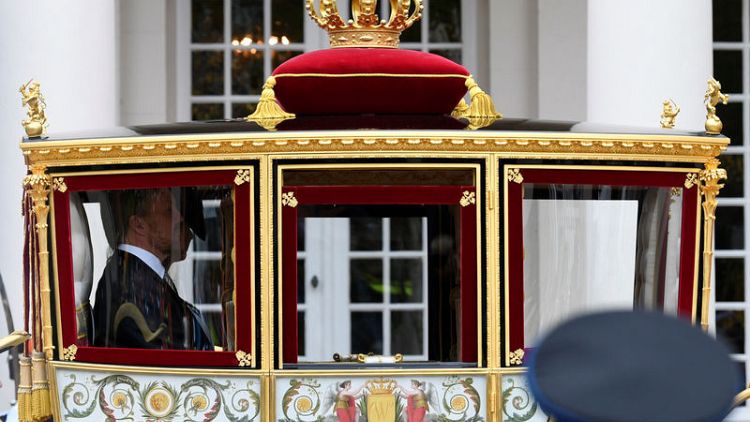By Toby Sterling and Bart H. Meijer
AMSTERDAM (Reuters) - Trade wars and the threat of Brexit were acting as a "profit warning" for the Dutch economy, and the government intended to increase investments to protect its future, Dutch King Willem-Alexander told parliament on Tuesday, in an address prepared by the government.
The address came as Prime Minister Mark Rutte's government released details of its 2020 budget, which featured spending increases on healthcare and housing. The government also confirmed it plans to create a national investment fund next year to take advantage of its ability to borrow at negative rates.
"The approaching Brexit casts its shadow forward," the monarch said in his annual speech. "It's a profit warning for the short term and the long term, that forces us to consider how the Netherlands will earn money in the future and remain a country with good social services."
The Dutch government estimates it will lose 1.2% of GDP by 2030 if Britain, a key trading partner, leaves the European Union.
Dutch GDP growth is forecast to slow to 1.8% this year and 1.5% in 2020, according to forecasts by the economic policy office CPB.
The government also confirmed plans to keep the corporate tax at 25% in 2020 and lower it to 21.7% in 2021. It also said it would reduce some tax deductions that have allowed multinationals such as Royal Dutch Shell Plc <RDSa.L> and Philips <PHG.AS> to cut their Dutch corporate tax bill to zero.
The moves to increase spending are modest: the country will still run an estimated surplus of about 0.3% of gross domestic product, down from a 1.2% surplus this year. This comes a week after European Central Bank President Mario Draghi urged Germany and the Netherlands to spend more to avert a downturn in the euro zone.
Among key spending increases earmarked for 2020 were 350 million euros (£310 million) for affordable housing, 300 million euros on youth healthcare programs, 134 million euros for immigration and asylum, 61 million euros on the judiciary and 51 million euros for defence.
Willem-Alexander said the government had a "growth agenda" and would present a draft plan next year for the national investment fund, which would target education and infrastructure.
"National debt is under control and the (tax) burden can be lowered," he said in his address to both houses of Parliament gathered in the 13th-century Hall of Knights in the Hague.
After years of austerity following the global financial crisis, the Dutch government is forecast to have a national debt of just 47.6% of GDP in 2020, well below European budget requirements.
(Reporting by Toby Sterling; Editing by AndreLarry King and Lisa Shumaker)



